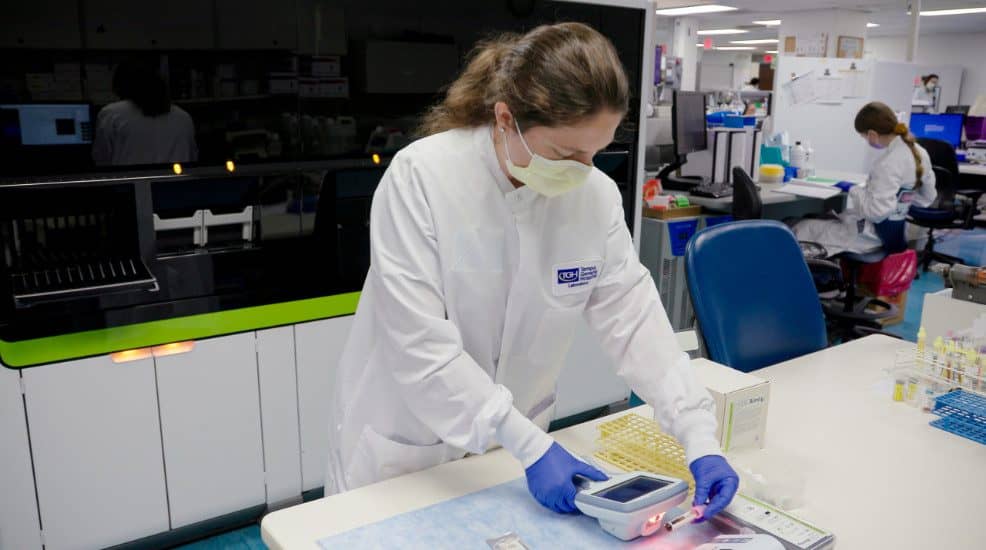Physicians at Tampa General Hospital’s emergency department are reportedly the first in the nation, outside of a clinical trial setting, to use an FDA-cleared rapid blood test to successfully evaluate patients who are 18 and older with mild traumatic brain injury (TBI), including concussions. Results are available in approximately 15 minutes.
To conduct a test, a plasma sample is inserted into the portable device, then the test can quickly provide important information that can help providers determine care and treatment plans. This streamlined process potentially can rule out the need for a CT scan.
A rapid blood test for evaluating concussions has the potential to be a real game-changer,” said Dr. Jason Wilson, associate professor, Department of Internal Medicine, in the USF Health Morsani College of Medicine and director of the Emergency Department Clinical Decision Unit, Tampa General. “It provides definitive data as we work to confirm a concussion or a traumatic brain injury.”
Neurological and cognitive exams have been the primary method of diagnosing a concussion. Typically, CT scans are used to identify a more serious injury such as a brain bleed. The i-STAT TBI Plasma test, developed by Abbott, a Chicago-based health care company, uses plasma from a patient’s blood sample to look for markers associated with brain injury to rule out the need for a CT scan.
The test has the potential to improve efficiencies in emergency departments, reduce wait times and improve overall quality of patient care.
“Patients can spend less time in the emergency department and will walk away with lab results that can help their doctors make treatment decisions for a full and successful recovery,” Wilson said.
Recently published research also demonstrated that the proteins this test measures may help clinicians predict recovery for someone with a more severe injury.
Here’s how the test works:
- This test measures specific proteins present in the blood after a traumatic brain injury, including concussion.
- A “not elevated” result can be used to rule out the need for a head CT scan.
- For those whose test shows elevated levels, the next step is often a CT scan, and clinicians could leverage both results to evaluate whether someone has a TBI.
- The test can free up resources in the emergency department, reducing cost and enhancing a hospital’s value-based care. For patients, it can reduce exposure to radiation from unnecessary CT scans for some, as well as lessen wait times in the emergency room.
“Tampa General is the first emergency department to use this test method and make it available for patient use,” said Michele Moran, senior nursing director in the Tampa General Emergency Department. “This test gives us another tool to properly evaluate potential TBI patients. During the risk assessment and physical examination of the patient, we will determine who can most benefit from the blood test versus the CT scan.”
“An immediate diagnosis of symptoms is important, especially for collegiate students who need to return to class,” said Dr. Dusty Narducci, assistant professor in the Department of Family and Sports Medicine at USF Health Morsani College of Medicine, Sports Medicine and Primary Care Provider at the USF Health Concussion Center, and a Family and Sports Medicine physician at Tampa General.
Symptoms of a concussion can begin right away or within hours after the impact or accident, so it’s important that the person is monitored for any immediate or gradual changes, experts say. Some people lose consciousness while others don’t. Specifically, a concussion occurs when the brain moves against the inside of the skull, causing bruising. The amount of brain damage determines concussion severity. Timely diagnosis of a concussion is critical, because if the patient doesn’t follow protocol, it can lead to problems. Tampa General officials advise anyone with a possible injury to check in with their health care provider and, if the symptoms are severe, go to a hospital emergency department.
Symptoms of an injury might include:
- Headache and dizziness
- Confusion or vomiting
- Optic nerve damage
- Balance issues
- Emotional swings
- Sleeping or appetite changes
[Source(s): Tampa General Hospital, PR Newswire]
[CAPTION: Tampa General Hospital is the first U.S. emergency department to offer a rapid blood test for concussion and traumatic brain injury to patients. The Abbott TBI Plasma test runs on a portable instrument that allows doctors to quickly assess individuals who are 18 and older with mild traumatic brain injury, including concussions. (Photo courtesy of Tampa General Hospital)]





